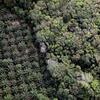Climate change & sustainability
Climate change and the over-consumption of natural resources threaten both wildlife and humanity. Zoos and aquariums have an exceptional opportunity to lead by example and engage the public in a vital dialogue and debate on environmental issues.
Acting sustainably means meeting the needs of the present without harming or compromising the future – or, to put it more simply, giving back at least as much as we take from nature.
Zoos and aquariums have a special responsibility, as they care for live animals and run breeding programmes for endangered species. Not only do zoos educate schools and the public about animal conservation, but they are well placed to engage their visitors, both young and old, in the wider challenges of achieving a more sustainable society.
BIAZA's Environmental Impact & Sustainability (EIS) Working Group supports zoos and aquariums to help meet these challenges and engage the public in environmental dialogue and debate.
Click here to see some examples of sustainability projects.

Palm Oil
Palm oil is one of the most widely used ingredients in the world and is found in a broad range of products, including foodstuffs, cosmetics, cleaning products, and fuel.
Production of palm oil however can have serious negative environmental and social impacts. Millions of hectares of tropical rainforest have been destroyed in recent years – most notably in Malaysia and Indonesia, and more recently in West Africa – to make way for oil palm plantations. This large-scale deforestation has huge implications for climate change as well as for many native species, including tigers and orangutans, which are being pushed closer to extinction as their habitat is destroyed and they come into increasing conflict with humans. Palm oil production also causes social conflict when small farmers, local communities, and indigenous peoples lose the rights to their land. There have also been numerous reports of workers’ rights being violated by plantation owners.

BIAZA encourages its members and the wider public to purchase products which only contain certified sustainable palm oil wherever possible. Useful links to help you make sustainable decisions include:


